Forward To The Past: The History of Science Fiction
In an essay I recently wrote for BookRiot, “The Genesis of Science Fiction,” I wondered just how old is science fiction? Many SF historians say Frankenstein by Mary Shelley is the first SF novel, while others dredge up stories as far back as classical Greece and Rome. I speculate science fiction began in prehistory, and look to The Book of Genesis for clues before we wrote things down.
Of course, what I wrote was wild speculation. Brian Stableford, in his new four volume science fiction history, New Atlantis: A Narrative History of Scientific Romance, carefully documents how science fiction was well entrenched in the 19th and early 20th century, way before it got the name science fiction. Back then, it was sometimes called Scientific Romance. Stableford’s four volumes are subtitled:
- The Origins of Scientific Romance
- The Emergence of Scientific Romance
- The Resurgence of Scientific Romance
- The Decadence of Scientific Romance
These books are not for casual science fiction fans, but for readers who love science fiction so much they want to know its deep history. Michael Dirda reviews them in more detail in his essay, “Formerly Future: The Lost World of the Scientific Romance.” I’ve always been keen on the history of our genre, and while these books are dry, technical and philosophical, I find them enlightening. Probably most readers feel science fiction is a modern invention, that emerged with atomic bombs, space travel and computers in the 1950s. You rarely see any mention of science fiction in popular culture before 1950, and our genre didn’t reach universal fame until 2001: A Space Odyssey and Apollo 11 in the late 1960s.
We think of science fiction being based on science. We want to believe that science fiction is different from fantasy, because we believe concepts imagined in science fiction are possible, while the creations of fantasy are not. But when you study the history of fiction, and the history of our species, you realize the psychology of our desires are revealed in both genres. One example is when Stableford discusses fantasy portals. Fantasy novels need a fictional gimmick to get regular people into a fantasy-land. For example, C. S. Lewis uses a wardrobe as a portal to Narnia. Star Trek has the transporter and Hyperion Cantos has the farcaster. Science fiction readers want to believe such machines are possible in the future. But is that realistic? Aren’t they really fantasy portals for science fictional fantasies? Stableford’s books go into that kind of analysis.
According to Stableford, 19th century writers, especially British and European, used science fiction to explore philosophical issues. He suggests Americans were the ones that got the idea of actually inventing all the fictional devices that the Europeans thought of as mere tricks to get their characters into the future or to other words. H. G. Wells didn’t believe in time machines, but he did believe in evolution, cosmology and geology, and he wanted to speculate what that knowledge implied.
I recommend New Atlantis for fans who want to be scholars of our genre. For average fans who just want a great overview of our classics, I recommend How Great Science Fiction Works by Gary K. Wolfe, a Great Course from the Teaching Company. It can be had cheaply at Audible.com for one credit. I describe the course and the books it covers in an essay at SF Signal.
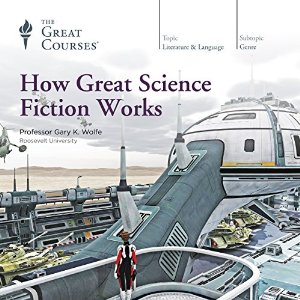 When I read old Radium Age science fiction like Goslings (1913) by J. D. Beresford and Herland (1915) by Charlotte Perkins Gilman, I feel those writers are focused on philosophical speculation, and not thrilling adventures. Which makes me wonder if science fiction has lost its way. Science fiction branched with Jules Verne and H. G. Wells. Americans, and now the world, has followed the path of Verne. Few follow the path of Wells.
When I read old Radium Age science fiction like Goslings (1913) by J. D. Beresford and Herland (1915) by Charlotte Perkins Gilman, I feel those writers are focused on philosophical speculation, and not thrilling adventures. Which makes me wonder if science fiction has lost its way. Science fiction branched with Jules Verne and H. G. Wells. Americans, and now the world, has followed the path of Verne. Few follow the path of Wells.
There is value in reading old science fiction. It can be a kind of self-analysis, revealing our deeper motives. Science fiction has always sold two products — wonders and warnings — about the future. If you embrace one product exclusively, you’ll be psychologically damaged. For too many readers, science fiction has become sense-of-wonder crack. Science fiction is now a money-making commodity, and lost is edge. Returning to the 19th century, and reviewing how science fiction evolved shows science fiction once had a different purpose. However, even the Victorian Age has been corrupted by modern science fiction into a Disneyland of bustles and steampunk gadgets.
I’m currently listening to Too Like the Lightning by Ada Palmer. Palmer is a Professor of History at the University of Chicago, with a PhD from Harvard. Her novel uses the past and philosophy like H. G. Wells to speculate about the future. I’m thrilled by its ideas and speculation, but I wonder if it will be thrilling enough for readers who took the path of Jules Verne?



















 Full Details
Full Details
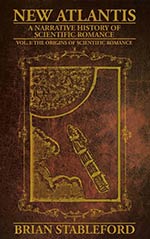
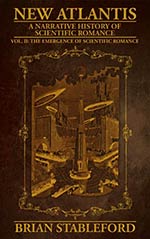
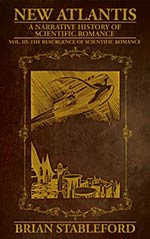
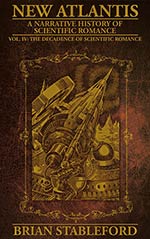
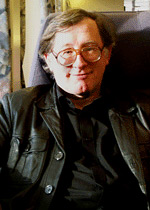


12 Comments
I do not share your blanket pessimism. I do not agree that SF has lost its edge.
Diverse 2015 books like Aurora, Seveneves, Luna: New Moon and The Water Knife all sell wonders and warnings, and all are cutting edge.
True, there is money in SF, but hasn’t that always been the case? Verne made money from his books. 1950ies SF was published by publishers as a money-making commodity too.
Where does this conservatism come from? Praising the philosophical purposes of 19th century writers in general statements is easy, but it plays down the merit of contemporary authors, as if they do not explore similar issues…
Bleebs, you have selected the exact books from last year that I would claim showcased science fiction with edge. Just look at the other 400 science fiction novels that were published last year and tell me how many others follow in the path of Wells? Hey, I still love Jules Verne and his descendants, but the older I get, the less I enjoy adventure science fiction. To do this, go to SF Signal, and then to the pull-down for Books Received and go through the 2015 books. That’s the real face of science fiction today.
Yes, some science fiction still has edge, but the majority of readers and watchers want fun, not philosophy.
The problems faced by 19th people are often the same problems we face today. One virtue of reading old science fiction is discovering the bigger picture of our problems.
I’d add Adam Roberts’s The Thing Itself to the list of excellent “philosophical” science fiction from 2015. Roberts, who is also an academic and critic, writes about his own disappointment with the current reception to this type of SF (and his own novel) in the context of a discussion of the Clarke Awards shortlist here: http://sibilantfricative.blogspot.co.uk/2016/05/blog-post.html
Even in the “golden age”, there was still plenty of pulpy adventure fiction mixed in with idea-based SF, but the proportion does seem much higher now. The Wellsian strand is a smaller slice of a bigger pie, making it harder to find than it used to be. I blame Star Wars!
As there were only about 2 billion people around 1900, of which only a fraction could read and write, let alone had easy access to books, comparing the periods is apples and oranges.
From the onset of mass media (starting with the introduction of both the pocket book and the television) there has been pulp, as Scott said. I’m not sure how to measure the proportion: as I’ve read boring & bad (by any standards) texts from the 17th century too, it’s just that they don’t get a lot of reprint. I have the feeling 98% of old SF (lets say 1900-1980) isn’t in print anymore either. That must have a reason.
Plus, there’s a bias at work too: one remembers good books easier than bad ones, so it seems like stuff used better. It’s no surprise these lines of thought occur to aging people.
Moreover, I wouldn’t pick Wells as the road to SF for the thinking man: “The Time Machine” is a philosophical heap of garbage. As speculation about evolution it might be a nice try, but it’s an abject failure. Always has been, always will. (“Frankenstein” is a much better pick: that book poses moral questions that are still relevant, framed in a way that is still interesting.)
But I should stress that I fully agree with one important part of what you wrote: most of what appears today is godawful bad. That goes for fantasy as for SF.
As it goes for about all other cultural products… Sturgeon’s Law is probably a conservative estimate.
Bleebs, I’m not trying to directly compare books across the ages but see how the urge to speculate about the future is expressed in different eras. The label science fiction gets used in too many ways to allow precise generalizations, but I still want to make them. If we just look at time travel stories, we can see that writers have always had a myriad of goals using the concept. The Time Machine by Wells was his tool for showing his audience that human life will come to an end, and even the Earth will no longer abide. I think his big bit of science fictional speculation was our species would branch into other species. I bet that was mind blowing for his Victorian audience.
I agree that Frankenstein is a richer story, but I don’t think The Time Machine is a heap of garbage. Wells was a populizer of science, as any good science fiction writer.
The trouble with our genre is it’s neither real science nor real philosophy. But the better writers of science fiction can create stories that help us see reality in both scientific and philosophical terms.
In no way do I want to imply that fun science fiction is bad. I’m no longer young, and thrill rides don’t call to me like they used to. And I’m jaded. I’ve read maybe as many as 2,000 SF books. It takes a special one to grab my attention.
But that might also explain why I’ve become fascinated with 19th century science fiction. What I can find has been distilled by the test of time which makes it more revealing.
By the way, I would guess that 99% of all books older than ten years are out of print, or mostly forgotten. I would guess that 90% of books are mostly forgotten the month after they are first published.
Scott, The Thing Itself does intrigue me. I wish it wasn’t only available as an ebook. I’m going to keep an eye out for Adam Roberts. The name seems somewhat familiar, so I’ve might have read a short story.
Fully agree on Wells probably being mind-blowing for Victorians, and his premise stripped down (humans will evolve) is right of course. I’m not debating his literary skills, The Time Machine is not bad writing. I just wondered why you pick him as a token author, as he’s not the sharpest thinker, judging from The Time Machine. I thought your article was very interesting, I just felt it stated some problematic conservative generalizations in the last but one paragraph. I’m also not sure what you mean by the path of Wells vs. the path of Verne: I do not see a clear dichotomy there.
I’m also not sure wether there is a significant difference between the urge to express the future this day and age or that urge in the Victorian age: philosophical issues still are explored in SF all the time by contemporary writers. You mention Gilman and Beresford being more focused on philosophical speculation, but how big is your sample?
I don’t think it is a problem SF isn’t science nor philosophy. There’s philosophers who argue that philosophy is just a genre of literature too (and I tend to agree with them). Fiction shouldn’t be science nor philosophy. As you say, the better writers do achieve new outlooks on reality in their readers, as a side effect of the story. Fiction puts that story first, as most fiction wants to entertain. That’s not a problem, as entertainment can be deep too. Science and philosophy don’t put the goal of entertainment first, and as such are generally more efficient ways of providing new outlooks, as in more new information/page count. Still, what they usually can’t do is making us readers experience this new outlook by means of the virtual reality/emotional experiences that novels are.
At one time Mr. Wells was known as one of the smartest men in the world, mainly because of his two volume History of the World, a book owned by many families, but because he wrote so many books, and expressed so many far out ideas.
But I mainly used Wells as an example because I had just read so much about him in the Stableford books. Stableford makes a good case for dividing SF intro the kind that follows Verne or Wells.
However, I think we should take a different tack on this subject. The word science fiction is much abused, and has little precise meaning. I think if we refine what we mean when we use science fiction as a pointer, it might help. I think a science fiction writer is a person that speculates and extrapolates about the future using fiction. Most writers who are called science fiction writers actually take older science fiction speculation and make it into a setting for a story. For example Star Wars. As far as I can tell there is zero speculation or extrapolation in it. It has become a colorful adventure tale. It’s more like the rich complexity of the Harry Potter books. A fun fantasy.
One of the things Stableford writes about is how Americans became enamored with technology. We want to make our adventure fiction real.
On the other hand, a book like Aurora is chock full of speculation and extrapolation. It is not about taking the reader on an adventure. It’s asking the reader to think. It’s actually pushing the science fiction reader to question their science fictional dreams.
Going back to the Verne and Wells example, Verne didn’t speculate much. I love his stories, but except for a few exceptions like Paris in the Twentieth Century they were more about adventures with new technology.
Gilman and Beresford were speculating about what would life be like if we only had women. Charlotte Perkins Gilman was the far superior thinker of the two, because she imagined an advanced society without men, based on a natural form of cloning. She ran with her idea. Her book is full of speculation.
Beresford, imagines men disappearing, and assumes that women wouldn’t do well. His main character, a man that survives, takes advantage of the situation. Beresford is also speculating, and probably more realistically, because he assumes what few men that were left would just screw things up. Because he failed to imagine something like cloning to keep his women going, he had to keep a few men, and the focus fell on them. It’s too bad he didn’t try to imagine a society without men.
Both books were written before women got the vote in American and Great Britain, and thus during a time period when the abilities of women were being discussed. That’s why the books were social and philosophical commentary. Decades later we had second wave feminists writing science fiction that took that speculation further.
To me, such speculation is the essence of science fiction. But that’s my narrow personal definition. Most people don’t see science fiction that way.
James, inspired by your article, I decided to bump ‘Last And First Men’, the 1930 debut Olaf Stapledon to the top of my reading list. I wrote a lengthy analysis of it on my blog, Weighing A Pig, that ties in a bit with some of the points you raise above. It surely fits your definition of SF well!
Direct link here:
https://schicksalgemeinschaft.wordpress.com/2016/05/30/last-and-first-men-olaf-stapledon-1930/
bleebs, I hope everyone follows your link to your review of Last and First Men by Olaf Stapledon — you’ve done an amazing amount of work to introduce people to that “novel.” I listened to this book last year, and it’s a truly wondrous feat of imagination. You took the time to study it, which I haven’t. As I listened to it, I often thought about how much time it would take to digest Stapledon’s speculation, and wondered if it’s worth it.
I hope to listening to Stapledon’s other words at Audible soon, like Star Maker, Sirius and Odd John. I’ve read the last two, but it’s been forty years.
I can understand why you ultimately pan the book, it’s not quite relevant. But, it is interesting as a science fiction artifact from the past. In a way it reminds me of Pierre Teilhard de Chardin and his concept of the Omega Point. These men had really big ideas, but are they valid for our day-to-day lives? Such big ideas show up in science fiction every few years. Remember The Hyperion Cantos? It even makes de Chardin a saint.
By the way, why did you switch from publishing her to your blog?
Thank you for the kind words! Teilhard de Chardin was a new name for me, I can see the link. As a way forward (to a peaceful world government for instance) I think works like Stapledon’s remain relevant & valid – maybe not for every day of our lives, but at least for the days we need to vote.
I switched to my blog to be able to interact with readers my reviews, and track the reading a bit. If you post a review only to WWE it just sits there, there’s hardly any follow-up or interaction, comments on reviews would be a great additional feature. I also liked the idea of having a place of my own, so it’s party an ego thing as well I guess. I’ve noticed I’ve grown a lot in writing reviews since the switch, I seem to put much more effort in my reviews as I used to, I guess having an own blog makes me want to preform better. I do still post excerpts & a link here, as so many do. But rest assured: WWE is still my number one SFF resource, you guys are doing invaluable work!
Sorry, the comment form is closed at this time.